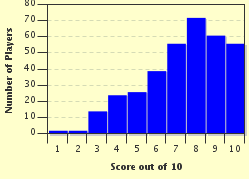Quiz Answer Key and Fun Facts
1. The term 'see the writing on the wall' originates from the fifth chapter of the Book of Daniel in the Old Testament. What particular event was taking place when Scripture says people actually saw fingers of an disembodied hand write a message on the wall?
2. A common saying used by people indicating they don't believe they have a responsibility to help the less fortunate is 'am I my brother's keeper?' This phrase was first used in Genesis 4:9. Who said it?
3. Sometimes when people feel they have been hit with a number of problems and issues, they say 'woe is me' The saying comes from 'woe to me' which appears in the Old Testament in both the KJV and NIV. Who is most famous for stating the words 'woe to me', forerunner of 'woe is me'?
4. The term 'labor of love' is mentioned in two different books in the New Testament. One book is credited with being written by Paul while the author of the second book is not known. Can you name the two books?
5. 'My cup runneth over' is a term that comes from Psalm 23, perhaps the most famous Psalm, in the Old Testament. What are the first five words of the Psalm?
6. 'The salt of the earth' is a common saying that appears in Matthew 5:13 in both the KJV and the NIV. Who spoke the words?
7. 'Apple of his eye' is a common saying that appears in two different books in the Old Testament, Deuteronomy 32:10 and Zechariah 2:8. In the two instances where the saying 'apple of his eye' appears, who does the word 'his' refer to?
8. 'A drop in the bucket' is a common saying that also originates in the Old Testament. It appears in Isaiah 40:15 in both the KJV and the NIV Bibles. Complete the missing word from the passage in the NIV Bible: "Surely the _________ are like a drop in a bucket; they are regarded as dust on the scales; he weighs the islands as though they were fine dust."
9. 'A fly in the ointment' is a common saying that comes from Ecclesiastes 10:1 where it states in the NIV Bible: "As dead flies give perfume a bad smell, so a little folly outweighs wisdom and honor." No name is given as to who wrote the book but who do many theologians suspect the author is?
10. 'Can a leopard change its spots?' is found in Jeremiah 13:23. The same verse also asks another negative rhetorical question, along the same line of thinking. What's the question?
Source: Author
Cowrofl
This quiz was reviewed by FunTrivia editor
CellarDoor before going online.
Any errors found in FunTrivia content are routinely corrected through our feedback system.

